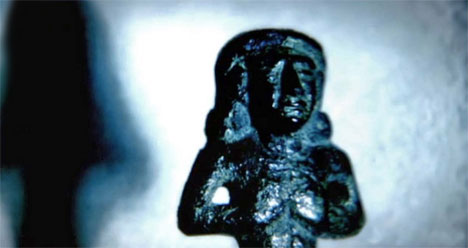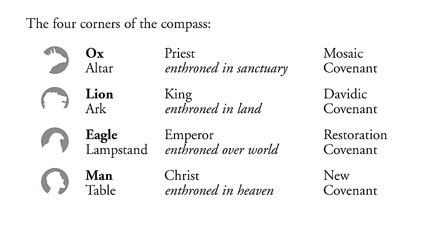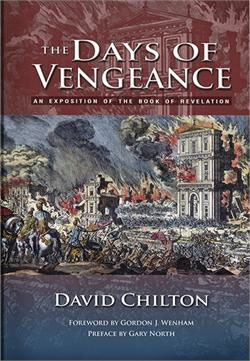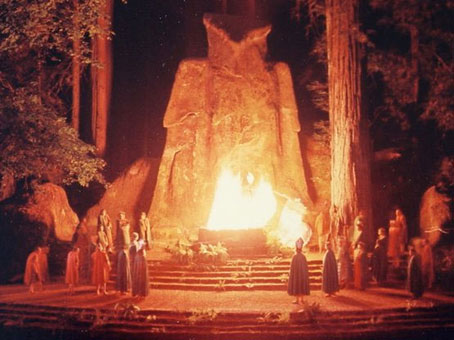Dec
22
2011

Along with many other academics — and many hymnwriters — J. R. Daniel Kirk believes the advent ended the Babylonian exile. He writes: “The exile was insufficient to pay for the people’s sins. So not only did the exile endure, so did the sins which were its cause.” Is really this the case? Israel never again worshiped the Canaanite gods. However, he still has a lot to say that is good:
Continue reading
Comments Off | tags: Babylon, Canaanites, Christmas, Covenant Theology, Exile, Matthew | posted in Bible Matrix, Biblical Theology, The Restoration Era
Jun
29
2009
James Jordan’s work on the Jew-Gentile oikoumene set up in Daniel has far reaching implications.1 Peter Leithart writes:
“Yoder argues that from the time of the Babylonian captivity, the Jews developed a proto-”free church” model of community life. True in some respects. Jews didn’t have their own polity. But I’ve got doubts if that’s a fair characterization of Jews in and after the exile.
Continue reading
Comments Off | tags: AD70, Archaeology, Daniel, Esther, Exile, Hellenism, Mordecai, Nehemiah, oikoumene, Peter Leithart, Tertullian, Yoder | posted in Biblical Theology, Quotes, The Last Days, The Restoration Era
Apr
21
2009
A friend of mine discovered John Piper and devoured just about every online sermon in under 12 months. It changed him profoundly. (I highly recommend Piper’s biographical series. I should listen to them again.)
Anyhow, my friend shared that Piper had made a comment about not ‘getting’ the prophets. As there are so many views on what the prophets are talking about, this is understandable. Based on what I’ve heard from James Jordan and my resulting studies, I would like to offer some helpful hints. They seem to play out, from what I can see.
Continue reading
Comments Off | tags: Bible history, Exile, James Jordan, John Piper, Literary Structure, Tabernacle, The Prophets | posted in Biblical Theology, The Last Days, The Restoration Era
Apr
13
2009
And He said to me, “Son of man, stand on your feet, and I will speak to you.” Then the Spirit entered me when He spoke to me, and set me on my feet; and I heard Him who spoke to me. And He said to me: “Son of man, I am sending you to the children of Israel, to a rebellious nation that has rebelled against Me; they and their fathers have transgressed against Me to this very day. (Ezekiel 2:1-3)
I started Hebrew lessons this week. We’ll see how long I last! Anyhow, my teacher made a comment about Ezekiel 2:1. Apparently, the phrase translated “I will speak to you” is actually a gloss. Literally, it says, I will speak you. The Lord gives Ezekiel a scroll to eat and sends him as son of man against Jerusalem.
So, as son of man, Ezekiel is the living, walking WORD. He is the Law written on tablets of flesh.
Comments Off | tags: Exile, Ezekiel, Hebrew, Translation | posted in Biblical Theology
Apr
11
2009

It was always God’s plan that Israel have a human king:
“When you come to the land which the LORD your God is giving you, and possess it and dwell in it, and say, ‘I will set a king over me like all the nations that are around me,’ you shall surely set a king over you whom the LORD your God chooses; one from among your brethren you shall set as king over you; you may not set a foreigner over you, who is not your brother.” Deut. 17:14-15
Like Adam, this dominion would only come by obedience: by servanthood to God and faithful mediatory witness to the Gentiles. But like Adam, they seized dominion and demanded “a king like the Gentiles.” With Saul, they had a king who palled around with Agag of Amalek whom Moses commanded to wipe from the face of the earth.
Continue reading
Comments Off | tags: Abimelech, Amalek, Babylon, Covenant Theology, Daniel, Exile, James Jordan, Malachi, Mordecai, Temple, Zechariah | posted in Biblical Theology, The Restoration Era
Apr
10
2009
Land.

I read David Chilton’s The Days of Vengeance in 1989, and it sure surprised me to learn that the word ‘earth’ in the Bible also means ‘land.’ This simple fact alters the scope of John’s Revelation entirely. It is about God’s ending of the Covenant He restored after the Babylonian captivity, and so first century Judah is the main subject. It was a repeat of events in Jeremiah’s day, so let’s backtrack a little…
Continue reading
15 comments | tags: AD70, Bible history, Compromise, David Chilton, Dispensationalism, Exile, Ezekiel, Noah, Resurrection, Temple | posted in Against Hyperpreterism, Biblical Theology, The Last Days, The Restoration Era
Apr
8
2009
The book of Daniel begins with the captured vessels from Solomon’s Temple being carried off to Babylon. We assume the ark, with its solid gold lid, was melted down. The golden lampstand, however, shows up at Belshazzar’s feast just before the fall of Babylon to Persia. Cyrus decrees that the Jews can return and rebuild the Temple. They carry the vessels, minus the Ark, across the Great River Euphrates.
Zechariah later sees a flying scroll with the dimensions of the Tabernacle (10 x 20 cubits). These are also the dimensions of the Ark plus cherubim in Solomon’s Temple. The Ark had been offered as an ascension and created a new heaven – unrolled a new scroll. The Restoration Covenant cost the Ark its “life.”
Now to Acts. The human Ark, Jesus, had ascended to heaven and left the “seven churches”, the New Covenant Lampstands with tongues of fire, to rule and conquer Babylon (Jerusalem). The church did so, and we see the firstfruits church army, the “kings from the sunrising” crossing the Great River in Revelation 16, entering a new earth like Joshua over Jordan.
Comments Off | tags: Ark of the Covenant, Babylon, Daniel, Exile, Lampstand, Revelation, Stephen, Tabernacle, Temple, Zechariah | posted in Biblical Theology, The Last Days
Apr
8
2009
 During the Creation week, there were three days of forming new “empty spaces” by dividing the original watery deep (the Abyss), then three days of filling them. A ‘world model’ develops with God’s throne at the top and the Abyss at the bottom, the place furthest from the throne. The architecture of the Tabernacle follows this model, laid out upon the ground.
During the Creation week, there were three days of forming new “empty spaces” by dividing the original watery deep (the Abyss), then three days of filling them. A ‘world model’ develops with God’s throne at the top and the Abyss at the bottom, the place furthest from the throne. The architecture of the Tabernacle follows this model, laid out upon the ground.
When the priesthood – the Land-mediators – disobeyed God, the Abyss was dredged up to cover the Land (holy place). We see this first in the flood, and later in the invasions of Assyria, Babylon and Rome.
The Valley of Hinnom became a symbol of the ‘Abyss’ below the true mountain of God. As an evil twin of the holy place, it was an ‘Adamic’ clay pit with no glorious metal. It was also the place where Judah sacrificed their infants to false gods. It was counterfeit worship in the tabernacle of hell, and the Lord said He would fill it with their bodies. Their dark ‘table of showbread’ became a snare. [Read Jeremiah 19]
After the Babylonian captivity, Zechariah saw the church in “the deep” (often translated valley or glen). A new Land-altar was rising out of the ‘waters’ – a new mountain of God, with a new Eden-temple to mediate for the world.
TAOTA
Comments Off | tags: Altar of the Abyss, Babylon, Creation Week, Exile, Gehenna, Jeremiah, Priesthood, Tabernacle, Table of Showbread, The flood, Zechariah | posted in Biblical Theology, The Restoration Era
Apr
8
2009
or Understanding the Restoration Era
Peter Leithart writes:
NT Wright has long argued that first-century Jews considered themselves to be in a continuing exile. The canon of the Hebrew Bible suggests as much.
If we take our arrangement (the LXX arrangement), the Hebrew Bible ends with Malachi, who certainly doesn’t see a gloriously restored Israel when he looks around him.
If we take the MT arrangement, the Hebrew Bible ends with the decree of Cyrus; it’s as if the return has never happened.
Either way, the canonical arrangement supports Wright’s contention.1
 I had a long debate with my friend Matt who holds Wright’s view. I see the point. But regardless of the arrangement of the canon, what does the Bible teach?
I had a long debate with my friend Matt who holds Wright’s view. I see the point. But regardless of the arrangement of the canon, what does the Bible teach?
I subscribe to Jordan’s view that the exile/restoration prophecies actually concern the exile/restoration. When Jeremiah predicted a New Covenant with Israel and Judah, it was the one ratified at the beginning of Zechariah. It came to pass, no bull. Those who apply the prophecies of restoration directly to the first century get it wrong.2
The Jews may have thought they were still in captivity. But they also thought the second Temple was less glorious than Solomon’s. Ezekiel’s Temple was a vision of an empire-wide temple made of people, synagogues spread throughout the empire. It was a picture of a restored Israel’s greater spiritual influence, in the same way that Revelation’s new Jerusalem is a picture of the church.
Like many Christians today, they were impatient for the Messiah to come and “wash behind their ears”, fix all their problems, when He had commanded them to conquer the world with their witness. The exile was long over, and atoned for as well. The Jews failed to understand the times they lived in, and so do we in many cases. Like Israel in Ezekiel 37, the first century church was an Israel resurrected for warfare.
_______
1 Peter J. Leithart, Continuing Exile and Canon.
2 Doug Wilson’s excellent new commentary on Hebrews, Christ and His Rivals, still does this from what I have read so far. To be sure, the apostles quoted the prophets because they prefigured the first century, but the details of the prophecies anchor them in previous history.
Comments Off | tags: Doug Wilson, Exile, Ezekiel's Temple, James Jordan, Jeremiah, N. T. Wright, Peter Leithart, Revelation | posted in The Restoration Era






























